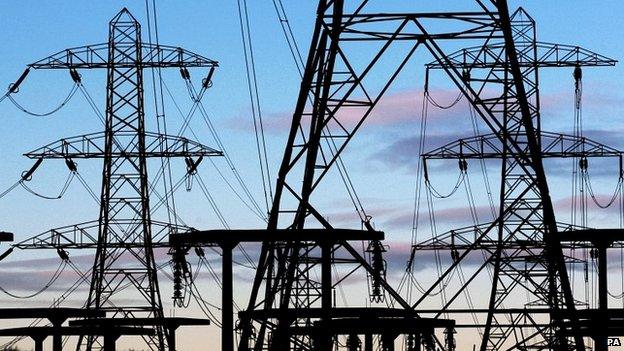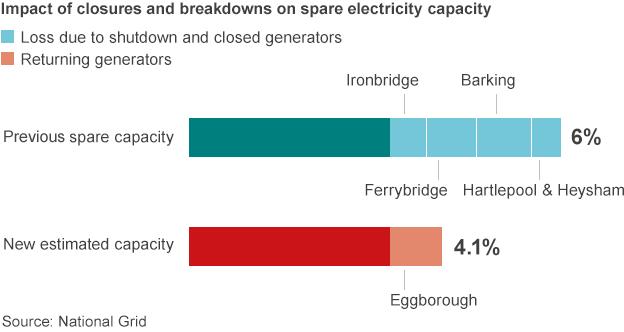National Grid warns of lower winter power capacity
- Published

National Grid has warned that its capacity to supply electricity this winter will be at a seven-year low due to generator closures and breakdowns.
Spare electricity capacity, which ran at about 5% over the winter months last year, would be nearer 4% this year, National Grid said.
Three years ago the margin was 17%.
But National Grid said it has contingency plans in place to manage supply, including paying big firms to switch off on cold winter evenings.
Cordi O'Hara, National Grid: "We plan for a range of scenarios"
Dismissing fears of possible electricity blackouts, energy minister Matthew Hancock told the BBC: "We are absolutely clear we are taking the measures necessary in order to have secure energy supplies this winter."

Professor Jim Watson of the UK Energy Research Centre, said: "I think it's… very unlikely we will see blackouts in the UK, but what it does mean, this tight situation, is that lots and lots of extra measures are having to be layered on top of an already complicated policy framework."
National Grid's assessment, made in its 2014/15 Winter Outlook report, external, is based on similar demand to last winter but a fall in supply, due to generators closing and breaking down, and new plants not coming online quickly enough to replace them.
Since 2012, 15 power plants have been closed or partially closed, taking out a large chunk of the UK's energy-generating capacity.

The network operator said it is finalising contracts with three UK power stations to provide reserve power in case of higher-than-expected demand.
Additional reserve contracts with Littlebrook, Rye House and Peterhead power plants to provide 1.1GW of power could increase this margin to more than 6%, said the operator.
The three stations were chosen following a tender process in which eight power stations offered a total of 5.4GW of power.
National Grid contingency plans include paying big firms to switch off on cold winter evenings
"The electricity margin has decreased compared with recent years, but the outlook remains manageable and well within the reliability standard set by the government," said Cordi O'Hara, director of market operations at National Grid.
Caroline Flint MP, Labour's shadow energy and climate change secretary, said: "The security of our energy supply has not been helped by the fall in investment under this government. With a quarter of our power stations closing this decade it is vital that we bring forward investment in secure and clean energy for the future."

Analysis: Roger Harrabin, BBC Environment Analyst
The traditional approach to electricity is building capacity to meet consumer demand, but one way of keeping the lights on is reducing demand for power in the first place.
Using more efficient appliances and insulating buildings is one way. Another is paying energy users to have their power switched off at peak times.
Large industrial plants go off the mains for a while and on to their own diesel generators.
Marriott Hotels in the UK switch off their air conditioning system for a few hours to save energy and money. Its spokesman says, external guests don't even notice because the temperature barely changes.
Studies suggest this all reduces the need for new power stations, helps the grid cope with intermittent renewable power, and saves money for customers.
Eventually individual householders may have intelligent appliances like freezers which switch themselves OFF to save electricity - and money - when demand is high.

Gas supplies
In the event of disruption of Russian gas supplies to Europe, National Grid said more expensive gas could be imported.
This would only happen in the "most extreme scenario", it said.
Energy Minister Matt Hancock says there will be improvements in two years
"The current uncertainty surrounding Eastern European gas supply stability due to the enduring tensions between Russia and Ukraine, could lead to curtailment of gas supplies in to Europe," said the owner and operator of the UK's power network.
Although the UK does not receive any gas directly from Russia, gas flows to Europe could be affected, which would in turn affect supplies to the UK, it added.
If necessary, the UK could import more liquefied natural gas from elsewhere, but this would cost more and could have implications for household bills.
Overall, however, gas supplies, storage and network capacity were "well in excess of maximum expected demand", the operator said.